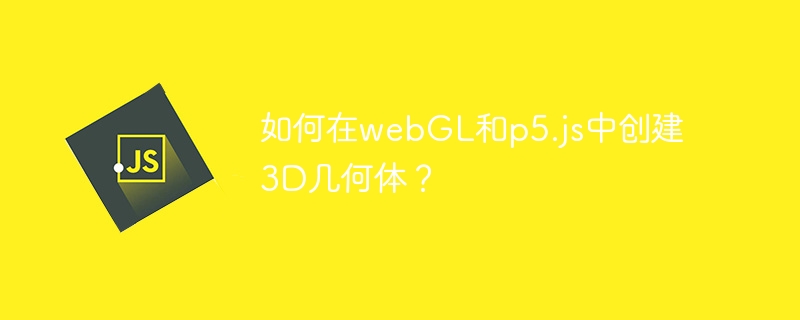如何在webGL和p5.js中创建3D几何体?

Creating 3D geometries in webGL and p5.js is a powerful way to create interactive and visually interesting web applications. With the ability to create basic shapes, add textures, lighting, and materials, and transform 3D geometries, we can create a wide range of 3D graphics and animations. By understanding the basics of webGL and p5.js, we can create stunning 3D geometries for their web applications.
3D形状创建
The first step is to generate some 3D geometries using webGL and p5.js built-in functions. These shapes can be produced using the library's built-in methods, such as sphere(), box(), and cylinder().
使用webGL
在webGL中,gl.drawArrays()函数可以用来构建基本形状。这个函数有三个输入参数,分别是基本图元类型、起始索引和要显示的索引数。例如,要创建一个球体,我们可以使用gl.TRIANGLES基本图元类型,并传入球体的顶点和索引。
Example
<!DOCTYPE html>
<html>
<head>
<script src="https://cdnjs.cloudflare.com/ajax/libs/three.js/110/three.min.js"></script>
</head>
<body>
<canvas id="canvas"></canvas>
<script>
// Set up the scene
const scene = new THREE.Scene();
// Set up the camera
const camera = new THREE.PerspectiveCamera(
75,
window.innerWidth / window.innerHeight,
0.1,
1000
);
camera.position.z = 5;
// Set up the renderer
const renderer = new THREE.WebGLRenderer({
canvas: document.getElementById("canvas"),
});
renderer.setSize(window.innerWidth, window.innerHeight);
// Create the sphere
const sphereGeometry = new THREE.SphereGeometry(1, 32, 32);
const sphereMaterial = new THREE.MeshBasicMaterial({ color: 0xffff00 });
const sphere = new THREE.Mesh(sphereGeometry, sphereMaterial);
scene.add(sphere);
// Render the scene
renderer.render(scene, camera);
</script>
</body>
</html>
Using p5.js
The createShape() function in p5.js can be used to make simple shapes. The CreateShape() function takes a single parameter i.e., “ the type of shape to be created”. To make a sphere, for example, we can use the createShape(SPHERE) method.
Example
<!DOCTYPE html>
<html>
<head>
<title>3D Sphere Example</title>
<script src="https://cdn.jsdelivr.net/npm/p5@1.1.9/lib/p5.min.js"></script>
</head>
<body>
<script>
function setup() {
createCanvas(windowWidth, windowHeight, WEBGL);
}
function draw() {
background(200);
// Create the sphere
push();
fill(255, 0, 0);
sphere(150);
pop();
}
</script>
</body>
</html>
Adding Textures
在生成了我们的3D设计之后,我们可以添加纹理来使它们更具吸引力。在webGL和p5.js中,可以分别使用gl.texImage2D()和texture() API将纹理应用于形状。
使用webGL
The gl.texImage2D() function in webGL is used to generate a 2D texture from an image file. This function accepts lots of arguments, including the target, level of detail, internal format, image width and height, and image data format and type.
Example
<html>
<head>
<script src="https://cdn.jsdelivr.net/npm/three@0.115.0/build/three.min.js"></script>
</head>
<body>
<script>
// Set up the scene
var scene = new THREE.Scene();
var camera = new THREE.PerspectiveCamera(
75,
window.innerWidth / window.innerHeight,
0.1,
1000
);
var renderer = new THREE.WebGLRenderer();
renderer.setSize(window.innerWidth, window.innerHeight);
document.body.appendChild(renderer.domElement);
// Create a cube
var geometry = new THREE.BoxGeometry(3, 3, 3);
var texture = new THREE.TextureLoader().load("https://images.pexels.com/photos/1029604/pexels-photo-1029604.jpeg?auto=compress&cs=tinysrgb&w=1260&h=750&dpr=1");
var material = new THREE.MeshBasicMaterial({ map: texture });
var cube = new THREE.Mesh(geometry, material);
scene.add(cube);
// Position the camera
camera.position.z = 5;
// Render the scene
function render() {
requestAnimationFrame(render);
cube.rotation.x += 0.01;
cube.rotation.y += 0.01;
renderer.render(scene, camera);
}
render();
</script>
</body>
</html>
Using p5.js
在p5.js中,texture()函数用于将纹理应用到一个对象上。texture()函数接受一个参数:纹理图像文件。
示例
<html>
<head>
<title>p5.js Texture Example</title>
<script src="https://cdn.jsdelivr.net/npm/p5"></script>
<script src="https://cdn.jsdelivr.net/npm/p5/lib/addons/p5.dom.min.js"></script>
<script src="https://cdn.jsdelivr.net/npm/p5/lib/addons/p5.sound.min.js"></script>
</head>
<body>
<script>
let img;
function preload() {
img = loadImage("https://images.pexels.com/photos/1029604/pexels-photo-1029604.jpeg?auto=compress&cs=tinysrgb&w=1260&h=750&dpr=1");
}
function setup() {
createCanvas(650, 300, WEBGL);
noStroke();
}
function draw() {
background(200);
texture(img);
rotateX(frameCount * 0.01);
rotateY(frameCount * 0.01);
box(100);
}
</script>
</body>
</html>
We applied WebGL and p5.js to build 3D geometry and applied animation in our web apps. We discussedsome basic concepts of creating 3D geometries in webGL and p5.js, including shapes, textures, lighting, and more.
以上是如何在webGL和p5.js中创建3D几何体?的详细内容。更多信息请关注PHP中文网其他相关文章!

热AI工具

Undresser.AI Undress
人工智能驱动的应用程序,用于创建逼真的裸体照片

AI Clothes Remover
用于从照片中去除衣服的在线人工智能工具。

Undress AI Tool
免费脱衣服图片

Clothoff.io
AI脱衣机

Video Face Swap
使用我们完全免费的人工智能换脸工具轻松在任何视频中换脸!

热门文章

热工具

记事本++7.3.1
好用且免费的代码编辑器

SublimeText3汉化版
中文版,非常好用

禅工作室 13.0.1
功能强大的PHP集成开发环境

Dreamweaver CS6
视觉化网页开发工具

SublimeText3 Mac版
神级代码编辑软件(SublimeText3)
 Python vs. JavaScript:学习曲线和易用性
Apr 16, 2025 am 12:12 AM
Python vs. JavaScript:学习曲线和易用性
Apr 16, 2025 am 12:12 AM
Python更适合初学者,学习曲线平缓,语法简洁;JavaScript适合前端开发,学习曲线较陡,语法灵活。1.Python语法直观,适用于数据科学和后端开发。2.JavaScript灵活,广泛用于前端和服务器端编程。
 从C/C到JavaScript:所有工作方式
Apr 14, 2025 am 12:05 AM
从C/C到JavaScript:所有工作方式
Apr 14, 2025 am 12:05 AM
从C/C 转向JavaScript需要适应动态类型、垃圾回收和异步编程等特点。1)C/C 是静态类型语言,需手动管理内存,而JavaScript是动态类型,垃圾回收自动处理。2)C/C 需编译成机器码,JavaScript则为解释型语言。3)JavaScript引入闭包、原型链和Promise等概念,增强了灵活性和异步编程能力。
 JavaScript和Web:核心功能和用例
Apr 18, 2025 am 12:19 AM
JavaScript和Web:核心功能和用例
Apr 18, 2025 am 12:19 AM
JavaScript在Web开发中的主要用途包括客户端交互、表单验证和异步通信。1)通过DOM操作实现动态内容更新和用户交互;2)在用户提交数据前进行客户端验证,提高用户体验;3)通过AJAX技术实现与服务器的无刷新通信。
 JavaScript在行动中:现实世界中的示例和项目
Apr 19, 2025 am 12:13 AM
JavaScript在行动中:现实世界中的示例和项目
Apr 19, 2025 am 12:13 AM
JavaScript在现实世界中的应用包括前端和后端开发。1)通过构建TODO列表应用展示前端应用,涉及DOM操作和事件处理。2)通过Node.js和Express构建RESTfulAPI展示后端应用。
 了解JavaScript引擎:实施详细信息
Apr 17, 2025 am 12:05 AM
了解JavaScript引擎:实施详细信息
Apr 17, 2025 am 12:05 AM
理解JavaScript引擎内部工作原理对开发者重要,因为它能帮助编写更高效的代码并理解性能瓶颈和优化策略。1)引擎的工作流程包括解析、编译和执行三个阶段;2)执行过程中,引擎会进行动态优化,如内联缓存和隐藏类;3)最佳实践包括避免全局变量、优化循环、使用const和let,以及避免过度使用闭包。
 Python vs. JavaScript:社区,图书馆和资源
Apr 15, 2025 am 12:16 AM
Python vs. JavaScript:社区,图书馆和资源
Apr 15, 2025 am 12:16 AM
Python和JavaScript在社区、库和资源方面的对比各有优劣。1)Python社区友好,适合初学者,但前端开发资源不如JavaScript丰富。2)Python在数据科学和机器学习库方面强大,JavaScript则在前端开发库和框架上更胜一筹。3)两者的学习资源都丰富,但Python适合从官方文档开始,JavaScript则以MDNWebDocs为佳。选择应基于项目需求和个人兴趣。
 Python vs. JavaScript:开发环境和工具
Apr 26, 2025 am 12:09 AM
Python vs. JavaScript:开发环境和工具
Apr 26, 2025 am 12:09 AM
Python和JavaScript在开发环境上的选择都很重要。1)Python的开发环境包括PyCharm、JupyterNotebook和Anaconda,适合数据科学和快速原型开发。2)JavaScript的开发环境包括Node.js、VSCode和Webpack,适用于前端和后端开发。根据项目需求选择合适的工具可以提高开发效率和项目成功率。
 C/C在JavaScript口译员和编译器中的作用
Apr 20, 2025 am 12:01 AM
C/C在JavaScript口译员和编译器中的作用
Apr 20, 2025 am 12:01 AM
C和C 在JavaScript引擎中扮演了至关重要的角色,主要用于实现解释器和JIT编译器。 1)C 用于解析JavaScript源码并生成抽象语法树。 2)C 负责生成和执行字节码。 3)C 实现JIT编译器,在运行时优化和编译热点代码,显着提高JavaScript的执行效率。






